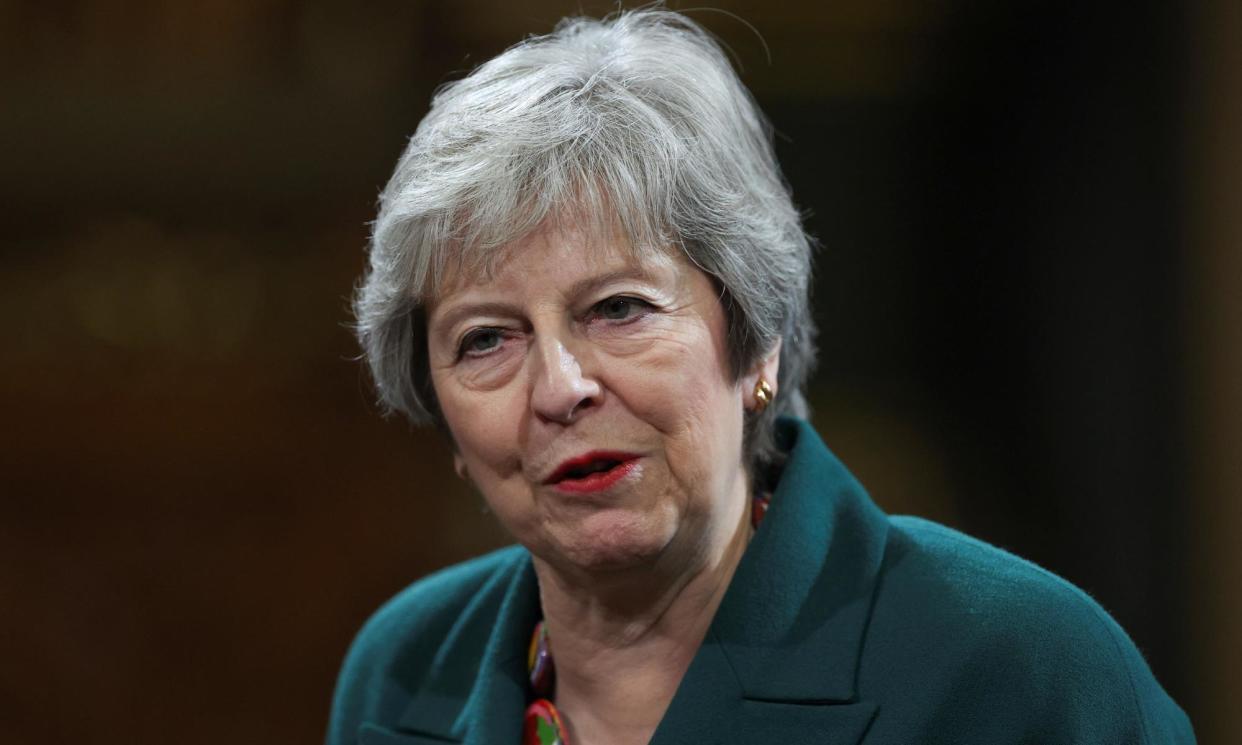Theresa May to step down as MP at general election

The former prime minister Theresa May will step down as an MP at the next general election after 27 years in parliament, becoming one of the most high-profile Conservatives to join a wave of departures from the House of Commons.
In a statement to the Maidenhead Advertiser, the Maidenhead MP said she wanted to focus on causes close to her heart, including her work on the Global Commission on Modern Slavery and Human Trafficking.
May, who was first elected in 1997, said: “Since stepping down as prime minister I have enjoyed being a backbencher again and having more time to work for my constituents and champion causes close to my heart including most recently launching a Global Commission on Modern Slavery and Human Trafficking.
“These causes have been taking an increasing amount of my time. Because of this, after much careful thought and consideration, I have realised that, looking ahead, I would no longer be able to do my job as an MP in the way I believe is right and my constituents deserve.”
As polls continue to show Labour with a significant lead over the Conservatives, May joins 64 Conservatives and former Conservatives who will not fight their seats at the next election – the highest number of Tories to retire from parliament since May entered the Commons in 1997. Labour has argued this shows there is “no confidence” in the prime minister, Rishi Sunak, and the Tory party’s electoral prospects.
May, 67, has been a consistent campaigner on modern slavery and human trafficking, and launched her global commission in October, backed by the UK and Bahrain governments.
She served as home secretary under David Cameron between 2010 and 2016 before succeeding him as prime minister.
Her term in Downing Street lasted a turbulent three years and was dominated by wrangling over Brexit. In a snap election in 2017, she lost her majority but remained in No 10 thanks to a deal with the DUP in the resulting hung parliament.
Conservative MPs, opposing her proposed Brexit deal, held a vote of confidence in her leadership. Although she survived, her authority was diminished and she announced her resignation five months later.
During her six years as home secretary in Cameron’s cabinet she coined the term “hostile environment”, which became a catch-all expression for controversial policies on illegal migration.
In her statement, May said it had been “an honour and a privilege” to serve as Maidenhead’s MP and vowed to continue working for her constituents until the general election, which is expected in the second half of this year.
She added: “As I pass the baton on I will be working with my successor to secure a Conservative victory in Maidenhead. I remain committed to supporting Rishi Sunak and the government and believe that the Conservatives can win the election.
“I would like to thank all those who chose me to represent them as their member of parliament.”
Responding to her announcement, the Labour MP Jess Phillips said on X: “Something very classy about this being in the Maidenhead Advertiser first. Love her or loathe Theresa May politics, she was famed for being a responsive and involved local MP.”
The Conservative MP Julian Smith, who served as chief whip under May, said on X: “I am very sorry to see that Theresa May is standing down as an MP. Our second female prime minister is an exceptional public servant with the highest integrity, relentless work ethic & total commitment to all parts of the United Kingdom in addition to her passionate campaigning for vital causes around the world.”
Caroline Nokes, the immigration minister under May, said: “On [International Women’s Day] I want to celebrate a colleague who showed us all the importance of hard work, commitment to your constituency and integrity. Parliament will be poorer (and I’m a bit sad – too many women standing down).”
Andrew Bowie, May’s former parliamentary private secretary, said: “I’m so sorry to see the woman I was proud to call boss and remain proud to call a friend standing down from parliament. It will leave the House of Commons a lesser place.
“Her dedication to her constituency, her country and her party is unmatched. Thank you Theresa.”
The Labour party chair, Anneliese Dodds, said the number of Tories standing down showed there was “no confidence” in Sunak and the Conservative party’s prospects.
The Treasury minister Gareth Davies denied this was the case, telling Sky News he was “personally sad” to see May stand down, but that it was “completely reasonable” for people to decide to leave parliament before an election.
He said: “Each one has made their own decision for personal reasons and I respect every single person’s decision to do so.”


